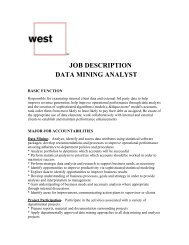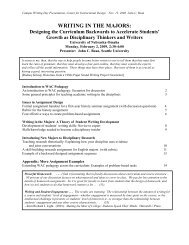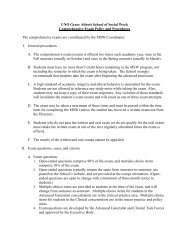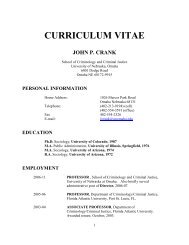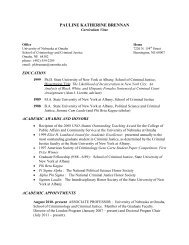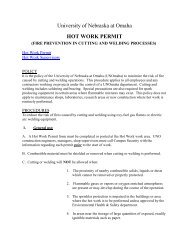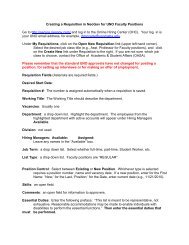The Solution to Global Warming
The Solution to Global Warming
The Solution to Global Warming
Create successful ePaper yourself
Turn your PDF publications into a flip-book with our unique Google optimized e-Paper software.
Approaches <strong>to</strong> Solving <strong>Global</strong><br />
<strong>Warming</strong>
Approaches <strong>to</strong> Solving <strong>Global</strong><br />
<strong>Warming</strong><br />
Background<br />
<strong>The</strong> Idea<br />
Going through the steps<br />
Summary
<strong>The</strong> <strong>Solution</strong> <strong>to</strong> <strong>Global</strong> <strong>Warming</strong><br />
What is the solution <strong>to</strong> <strong>Global</strong> <strong>Warming</strong>?<br />
Biofuels such as ethanol?<br />
Mass transit replacing individual<br />
au<strong>to</strong>mobiles?<br />
Wind and solar power?<br />
Nuclear power?<br />
Carbon sequestration?<br />
None of these and possibly all of these.
<strong>The</strong> <strong>Solution</strong> <strong>to</strong> <strong>Global</strong> <strong>Warming</strong><br />
<strong>The</strong>re is no one solution <strong>to</strong> <strong>Global</strong><br />
<strong>Warming</strong>.<br />
<strong>The</strong>re is no one cause of <strong>Global</strong><br />
<strong>Warming</strong>.<br />
<strong>The</strong>re are still respected scientists<br />
who believe the current warming is<br />
part of the natural cycle.
Approaches <strong>to</strong> Solving <strong>Global</strong><br />
<strong>Warming</strong><br />
But what if the <strong>Global</strong> <strong>Warming</strong><br />
skeptics are right?<br />
We are still nearing the peak of<br />
crude oil production and worldwide<br />
demand continues <strong>to</strong> increase.<br />
We are using our resources at an<br />
unsustainable rate.
Approaches <strong>to</strong> Solving <strong>Global</strong><br />
<strong>Warming</strong><br />
We can’t take the sprinter’s view of<br />
using our resources.<br />
We’re in a marathon – we<br />
can’t deplete our<br />
resources and have<br />
nothing for the end of the<br />
race (or <strong>to</strong> pass on <strong>to</strong><br />
future generations).
Approaches <strong>to</strong> Solving <strong>Global</strong><br />
<strong>Warming</strong><br />
So what can we do?<br />
You as the major energy consumer<br />
of the world can have a huge impact.
Per Capita Electricity Consumption<br />
Author: Frank van Mierlo. Graph was produced from data in the 2006 Key World Energy Statistics from the<br />
International Energy Agency.
Your actions will:<br />
have twice the impact of a person in England or<br />
South Korea (and twice the CO 2 emissions)
Your actions will:<br />
have 8 times the impact of a person in China. (5<br />
times the CO 2 emissions.)
Your actions will:<br />
have 29 times the impact of a person in India. (19<br />
times the CO 2 emissions.)
Approaches <strong>to</strong> Solving <strong>Global</strong><br />
<strong>Warming</strong><br />
“Stabilization Wedges: Solving the<br />
Climate Problem for the next 50<br />
Years with Current Technologies” S.<br />
Pacala and R. Socolow, 2004 Science<br />
305 968-972
Approaches <strong>to</strong> Solving <strong>Global</strong><br />
<strong>Warming</strong><br />
In this paper Pacala and Socolow present<br />
a set of wedges each of which represents<br />
a way <strong>to</strong> offset 1 billion <strong>to</strong>ns of carbon<br />
emissions per year by 2054.<br />
<strong>The</strong> authors assume the process currently<br />
is unused, but the application will be<br />
increased linearly over the next 50 years.
Modified figure from S. Pacala and R. Socolow, 2004 Science 305 968-972<br />
Stabilization of carbon emissions at<br />
current levels – need 7 wedges
More “wedges” could be applied <strong>to</strong> reduce<br />
emissions further – can adjust <strong>to</strong> meet<br />
priorities.<br />
Modified figure from S. Pacala and R. Socolow, 2004 Science 305 968-972
Application of some “wedges” may<br />
decrease the effectiveness of<br />
others.<br />
Modified figure from S. Pacala and R. Socolow, 2004 Science 305 968-972
All the wedges represent current<br />
technologies.<br />
Modified figure from S. Pacala and R. Socolow, 2004 Science 305 968-972
I. Efficiency and Conservation<br />
1. Double au<strong>to</strong>mobile fuel efficiency<br />
(that’s less than 2% increase in fuel<br />
efficiency per year)<br />
– Buy a more efficient vehicle (when you can)<br />
http://www.<strong>to</strong>yota.com/prius/exterior.html and asmartcar.com<br />
http://www.caranddriver.com/carmodel/hummer-h3.htm
I. Efficiency and Conservation<br />
2. Decrease reliance on cars<br />
(same fuel efficiency, but cut use by 50%)<br />
Walk, ride or at least be smarter with your<br />
trips.<br />
http://en.wikipedia.org/wiki/Walking www.Metroareatransit
I. Efficiency and Conservation<br />
ftp://ftp.sunet.se/pub/pictures/tv.film/Muppet_Show/kermit.gif
I. Efficiency and Conservation<br />
3. Increase efficiency in buildings<br />
(especially in developing countries)<br />
Do what you can <strong>to</strong> make your living space<br />
more efficient – insulate, turn off lights,<br />
computers, etc.<br />
http://www.boldstarinfrared.com/homeimages.html<br />
www.remax.com (a house in omaha)<br />
http://www.unomaha.edu/enotes/2006/0119.php
I. Efficiency and Conservation<br />
4. Increase coal power plant<br />
efficiency by 50%<br />
http://en.wikipedia.org/wiki/Fossil_fuel_power_plant
II. Decarbonization of Electricity<br />
and Fuels<br />
5. Substitute natural gas for coal.<br />
Carbon emissions are about half those of<br />
coal plants.<br />
Increase use 4-fold<br />
http://en.wikipedia.org/wiki/Fossil_fuel_power_plant
II. Decarbonization of Electricity<br />
and Fuels<br />
6. Carbon sequestration<br />
Capture power plant emissions and sequester<br />
underground.<br />
Support efforts <strong>to</strong> limit allowable CO 2 emissions.<br />
Chemical and Engineering News, Sept 24, 2007, Bette Hillman and Jeff Johnson
II. Decarbonization of Electricity<br />
and Fuels<br />
7. Carbon sequestration from<br />
hydrogen plants<br />
http://www.getenergysmart.org/Files/<br />
HydrogenEducation/6HydrogenProduction<br />
SteamMethaneReforming.pdf
II. Decarbonization of Electricity<br />
and Fuels<br />
8. Carbon sequestration from synfuel<br />
plants.<br />
Large scale production of<br />
synthetic fuel from coal (similar<br />
<strong>to</strong> current work in South Africa)<br />
http://sasol.inves<strong>to</strong>reports.com/sasol_mm_2006/html/sasol_mm_2006_9.php
II. Decarbonization of Electricity<br />
and Fuels<br />
9. More nuclear fission power plants<br />
Roughly a doubling of current nuclear power<br />
use worldwide<br />
Seriously consider pros and cons.<br />
http://wesupportlee.blogspot.com/2006/10/m<br />
ajor-renovations-at-fort-calhoun.html
II. Decarbonization of Electricity<br />
and Fuels<br />
10. More wind generated electricity<br />
Assume turbine operate at 1/3 peak capacity.<br />
Increase about 50 times current capacity.<br />
Requires land mass about equal <strong>to</strong> 3% of U.S.<br />
http://www.nytimes<br />
.com/2006/08/02/u<br />
s/02wind.html; of<br />
wind farm in Kansas
II. Decarbonization of Electricity<br />
and Fuels<br />
11. Solar power (pho<strong>to</strong>voltaic)<br />
Increase about 700 times current capacity.<br />
This requires less than one tenth the land<br />
needed for the wind “wedge”<br />
http://www.soultek.com/blog/labels/solar%20powe<br />
r.html<br />
http://www.evworld.com/article.cfm?s<strong>to</strong>ryid=856
II. Decarbonization of Electricity<br />
and Fuels<br />
12. Renewable Hydrogen<br />
Use Wind or Solar electricity for electrolysis<br />
of water <strong>to</strong> make hydrogen fuel for vehicles.<br />
http://hydrogencommerce.com/ind<br />
exa2.htm
II. Decarbonization of Electricity<br />
and Fuels<br />
13. Biofuels<br />
If ethanol, need <strong>to</strong><br />
increase<br />
production about<br />
50-fold<br />
Would require an<br />
area equal <strong>to</strong> 1/6<br />
current cropland.<br />
(About 10 times<br />
the land<br />
requirement for a<br />
wind “wedge”.)<br />
National Geographic Oc<strong>to</strong>ber 2007
III. Natural Sinks<br />
14. Forest Management<br />
Reduce the rate tropical deforestation so it is zero in<br />
50 years.<br />
Reforestation of some tropical and temperate areas<br />
Pho<strong>to</strong> © Mark Godfrey/TNC
III. Natural Sinks<br />
15. Agricultural soils management<br />
Adopt conservation tillage so agricultural<br />
land is not tilled. (Decreasing release of<br />
carbon from the soil <strong>to</strong> the atmosphere.)<br />
Conservation tillage would have <strong>to</strong> be<br />
increased about 10-fold.<br />
http://www.agry.purdue.edu/cti/images/
Approaches <strong>to</strong> Solving <strong>Global</strong><br />
Summary<br />
<strong>Warming</strong><br />
– <strong>The</strong>re is no one solution <strong>to</strong> address<br />
carbon dioxide release or sustainable<br />
energy production.
<strong>The</strong> <strong>Solution</strong> <strong>to</strong> <strong>Global</strong> <strong>Warming</strong><br />
Summary<br />
– Employ<br />
best practices <strong>to</strong> conserve energy,<br />
apply current technologies <strong>to</strong> energy<br />
generation and<br />
increase biomass through better land<br />
management<br />
Can help mitigate carbon emissions<br />
and propel us <strong>to</strong>ward sustainable<br />
energy production.
<strong>The</strong> <strong>Solution</strong> <strong>to</strong> <strong>Global</strong> <strong>Warming</strong><br />
YOU can help more than most any<br />
other individuals on this planet.<br />
Start with conservation<br />
– You can eliminate a lot of waste.<br />
– Support renewable energy.<br />
We need <strong>to</strong> use our energy wisely so<br />
we can finish the race!
<strong>The</strong> <strong>Solution</strong> <strong>to</strong> <strong>Global</strong> <strong>Warming</strong><br />
What will you do??




